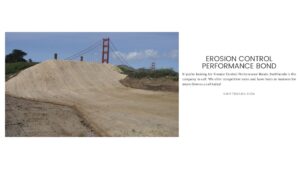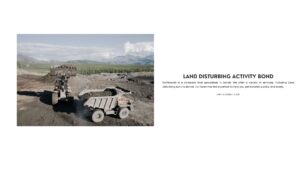You can now apply online for a Performance Bond – it only takes three (3) minutes! (Yep, we timed it.) Click here:
Or you Can download our Express Performance Bond Application (click to download form)
- Complete the form and email to [email protected]
- Be sure to include the Contract and Notice of Award letter (bid specs from the obligee).
- Send the bid results if you have them
When a coal mine is reclaimed, a performance bond is often required to ensure that the land is properly restored. Let’s take a closer look at what a performance bond is and why it’s important in coal reclamation.

What is a reclamation bond surety bond?
A reclamation bond is a type of surety bond that is required in order to obtain a permit for certain types of land development projects. The bond is in place to ensure that the developer will properly reclaim the land after the project is completed.
How does a reclamation bond work?
Reclamation bonds are a type of surety bond that helps to ensure that a contractor will properly reclaim the project site after completion. The reclamation process is important to protect the environment and public health. The reclamation bond is released to the contractor after the project has been properly reclaimed.
Reclamation Bonds Provide Long Term Certainty
As the drought in California continues, water is becoming an increasingly precious resource. The state has tried a variety of methods to increase its water supply, including building desalination plants and increasing water conservation.
One method that has been proposed to increase the state’s water supply is to use reclamation bonds. Reclamation bonds are a type of bond that is used to finance the construction of water projects.
Reclamation Bonds are contracts, not insurance
Between a principal (the project owner) and surety (insurance company), in which the surety agrees to pay the obligee (a government agency) a sum of money if the principal fails to perform certain obligations, including but not limited to, completing the project according to plans and specifications, obtaining all necessary permits, and correcting any deficiencies. The premium for the bond is generally a percentage of the total project cost and is paid by the principal to the surety.
Companies must comply with high standards for operations and reclamation
These standards are set by the government and are designed to protect the environment. Companies that do not comply with these standards can be fined or even shut down.
The standards for operations and reclamation are constantly changing. This can be a challenge for companies, especially small businesses. They must make sure that they are up-to-date on the latest standards.
Reclamation Bonds Have Many Stakeholders
The Bureau of Reclamation is the primary federal agency responsible for water resources in the western United States. The bureau manages dams, canals, and hydroelectric power plants that supply water for irrigation, drinking water, and other purposes.
The bureau is also responsible for protecting and enhancing the environment in the west. Reclamation bonds are one of the primary ways the bureau finances its operations and projects.

Tell me the purpose of land reclamation bonds?
Land reclamation bonds are special types of municipal bonds that are used to finance the costs associated with reclaiming land that has been damaged or polluted. Land reclamation can be a costly and time-consuming process, so these bonds are typically issued by state or local governments. The proceeds from the sale of the bonds are used to pay for the costs of environmental cleanup, site preparation, and other activities necessary to make the land suitable for development.
How to Keep Reclamation Bond Costs in Check?
The reclamation bond process is designed to protect the state and taxpayers in the event that a mining company does not fulfill its reclamation obligations. The process begins when a mining company applies for a permit from the state.
If the state approves the permit, the company must post a reclamation bond. The amount of the bond is based on an estimate of the cost to reclaim the site.
How to apply for a reclamation bond?
There are a few things you’ll need to do in order to apply for a reclamation bond. First, you’ll need to contact the Department of Environmental Protection in your state. They will be able to provide you with the necessary application forms. Once you have the forms, you’ll need to fill them out and submit them to the department.
After your application has been reviewed, you’ll need to post the bond. The amount of the bond will be based on the size and scope of your project. Once the bond has been posted, you’ll be able to begin work on your project.
How much does a reclamation bond cost?
The cost of a reclamation bond will depend on the specific project that is being bonded, as well as the state in which the project is located. In most cases, the bond will be a percentage of the total project cost, with a minimum amount set by the state. For example, in Colorado, the minimum reclamation bond amount is $50,000.
To get an accurate estimate of the cost of your reclamation bond, we recommend contacting a surety bonding company. At Swiftbonds, we offer free quotes on all of our bonds, so you can get an idea of the cost before moving forward with your project.
Who should get a reclamation bond?
There are a few different types of reclamation bonds, and the type you need will depend on your project. If you’re doing any type of construction or excavation on state or federal land, you’ll need to get a surety bond. If you’re mining on private land, you’ll need to get a performance bond. And if you’re doing any type of work that could potentially damage the environment, you’ll need to get an environmental bond.
How are claims handled for reclamation bonds?
The first step is to notify the surety company that a bonded project has failed to meet its reclamation obligations. The notice must be in writing and must include information about the project and the specific bond that is being claimed. The surety company will then investigate the claim to determine whether it is valid.
Swiftbonds
4901 W. 136th Street #250
Leawood, KS
66224
Tel:(913) 214-8344,
E-mail: [email protected]

